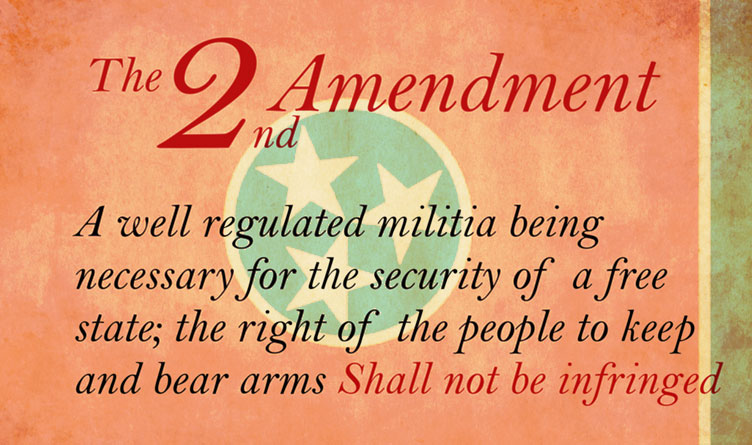Image Credit: Public Domain
By John Harris [Tennessee Firearms Association] –
Recently, I was speaking with a group concerning Tennessee’s gun laws. At this particular meeting, the issue that I spoke on was the difference between a constitutionally protected right and a state regulated privilege. The example I used to illustrate the contrast between constitutionally protected rights and state regulation of privileges was the current laws in Tennessee concerning civilian options to carry a firearm in Tennessee.
When I asked how many felt that the 2nd Amendment protects an individual right to keep and bear arms and to carry those arms, almost everyone raised their hands or nodded approvingly. I commented that my experience has shown that Tennesseans, individual Tennesseans do love their firearms and that they embrace the belief that it is their right to carry a firearm for lawful purposes such as self-defense. I also explained, however, that while individual Tennesseans may hold that opinion, the state of Tennessee does not and apparently never has.
Just last week, the United States Supreme Court heard oral arguments in a case called New York Rifle and Pistol Association v. Bruen, Docket 20-843.
During the oral arguments in the case, both the attorney representing the state of New York and the attorney representing the Department of Justice both emphasized that Tennessee was a state with perhaps the longest history of prohibiting its citizens from carrying firearms in public and that Tennessee has long regulated the ability of individuals to do so. It was quite disheartening but not surprising to hear that this is the reputation of the state of Tennessee.
Looking at Tennessee statutory history, Tennessee has had several statutes which generally prohibited individuals from carrying firearms in public or sometimes in private for the purposes of going armed. The current version of that statute is found in Tennessee Code Annotated Section 39-17-1307(a)(1) and it simply states that it is a crime for an individual to carry any firearm with the intent of going armed.
I discussed how the free exercise of “rights”, particularly constitutionally protected rights, are never prohibited by statute although a statute might punish the abuse of such a right – such as if someone were to commit murder with a firearm. In that case, it would not be the carrying of the firearm that is punished but the wrongful use of the firearm when it is employed to commit a crime, i.e, the murder.
In contrast, when the state regulates an activity such that even its non-criminal exercise can be punished such as carrying a firearm for self-defense, then the conduct is not the exercise of a right but it is the exercise of a regulated privilege without compliance with all of the state’s conditions.
Obviously, that discussion used the Governor’s 2021 “permitless carry” law as an example of the state’s regulation of an activity as if it were nothing more than a privilege rather than the hands-off treatment of it as a constitutionally protected right.
As part of the group discussion when question and answer session began, a state legislator, who voted for the bill, wanted to address the group and explained why the legislator felt that the 2021 law was a good law and in so doing the legislator used the assertion that the restrictions contained in it pertaining to age, DUI restrictions, mental health restrictions, stalking restrictions, handgun only restrictions, etc., were all “reasonable” or “good” limits on who should be allowed to carry a gun. The legislator seemed quite sincere in this presentation. However, the point is that all of these qualifiers are restrictions on the exercise of the activity thus suggesting the premise that the conduct is viewed by this legislator and the majority of other Tennessee legislators as nothing more than a privilege.
Focus for the moment on what you have likely heard other legislators argue – that the qualifications and conditions such as background checks, state required training, age limits, geographic limits, etc., are all “reasonable” limits. Now, look at what the courts have said on some 1st Amendment issues by analogy.
Many in America and perhaps many in Tennessee might think it to be a good idea and reasonable to prohibit people from desecrating the American flag. But the courts have said that such conduct, even if offensive to almost everyone else, is protected by the 1st Amendment because it is an exercise of the freedom of speech.
Likewise, many might think it a good idea and reasonable to prohibit public displays of nudity, public discussions on carnal sex, public parades on what some view as deviant sexual conduct or even sexual conduct condemned in the Bible but the courts have concluded that the First Amendment protects such expressions, parades, and public statements to a degree that is more allowing than what most citizens are willing to tolerate.
The point is that constitutionally protected individual rights are not mere privileges that the government can regulate in its discretion whenever it can assert that the restriction is a “good idea” or “reasonable”.
*** Click Here to Support Conservative Journalism in Tennessee. We can’t bring you articles about 2nd Amendment Rights without your support!***
Fundamental rights that are expressly protected by the constitution are not to be and cannot be restrained merely because elected officials or government agents believe that the restriction or prohibition might seem reasonable.
Rights cannot be restrained in their lawful exercise merely because some might think it is necessary to protect their views of “appropriate conduct”.
Rights – those rights that the constitutions actually recognize – are never to be measured in their exercise by whether some government official thinks the restriction is reasonable or a “good idea”. Hitler thought, or at least said, that disarming the Germans would make that country safer – yet his goal was not safety of the people but disarming them for the government’s benefit.
Constitutionally recognized rights are or should be beyond the whims of government officials or their transitory ideas of what is reasonable. Indeed, they are beyond infringement even when perhaps a majority in the community think the restriction might be worthy or reasonable.
What is within the scope of government powers is and should be limited to situations where someone wrongfully exercises a constitutionally protected right to perpetrate an independent crime – such as a murder. However, the just exercise of the right in and of itself should never itself be a crime.
That is one of the problems with Bill Lee’s 2021 “permitless carry” law and with the permitting laws as well. All of these laws address the issues and their circumstances as if the state government has complete and absolute discretion on what to, in the words of Rep. William Lamberth, “allow” or disallow the citizens to do. Rights are not the subject of allowances. That is why the ratifying states demanded that the 2nd Amendment declare the right to keep and bear arms to be absolutely beyond government infringement.
There is much to be done in Tennessee if you truly believe that the 2nd Amendment protects an individual right and not just a privilege or an “allowable” activity. As Ronald Reagan demanded that Russia “tear down this wall”, Tennesseans must put pressure on those now in government to “tear down these infringements” when it comes to the 2nd Amendment. When most of them refuse to do so, as they have now for 2 centuries and have clearly done for the last decade under a Republican super majority, then another word of advice from Ronald Reagan comes into play —
“When you can’t make them see the light, make them feel the heat.”
About the Author: John Harris is the Executive Director of The Tennessee Firearms Association. You can contact TFA here. You can join TFA here.




